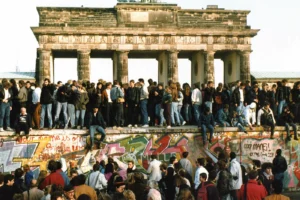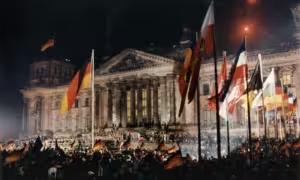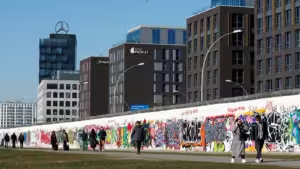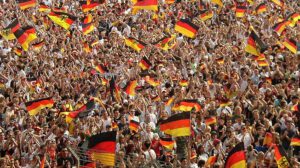German Unity Day, observed on October 3rd, is a historic day for Germany, celebrating the reunification of East and West Germany after decades of division. This pivotal event in 1990 symbolized the end of Cold War hostilities within Germany and laid the foundation for a modern, unified country. German Unity Day, also known as “Tag der Deutschen Einheit,” is celebrated with great enthusiasm, hosting numerous events, ceremonies, and festivities across the nation. Here there are five key facts about German Unity Day, the historical context behind it, and its lasting impact on contemporary Germany:
1. The Accession Treaty: A Legal Pathway to Reunification
On October 3, 1990, the Accession Treaty was signed, marking the official reunification of Germany. Under this treaty, the German Democratic Republic (GDR), or East Germany, formally joined the Federal Republic of Germany (West Germany), ending over 40 years of division. The treaty was signed by representatives of both sides, declaring that East Germany would dissolve its sovereignty and integrate into the political and legal framework of West Germany. This unification process wasn’t merely symbolic; it involved the merging of political structures, social systems, and economies—a significant effort that would come to define the new German state.
The signing of the Accession Treaty fulfilled the desire of millions of Germans to live as one unified nation. By doing so, it represented a peaceful solution to the Cold War divisions in Europe, making October 3rd a lasting symbol of unity and resilience. The treaty remains a monumental document in Germany’s history, setting the framework for a democratic Germany that includes equal representation for all its citizens.
2. The Fall of the Berlin Wall: A Catalyst for Unity

The fall of the Berlin Wall on November 9, 1989, was a groundbreaking event that set the stage for German reunification. This iconic wall divided East and West Berlin, acting as both a physical and ideological barrier during the Cold War. Constructed in 1961 by East Germany, the Berlin Wall was intended to prevent East Germans from fleeing to the West. For decades, it symbolized the deep-rooted political tensions between the communist and capitalist blocs.
The collapse of the Wall was precipitated by a series of peaceful protests in East Germany, where citizens demanded freedom and democracy. These demonstrations grew stronger throughout 1989, ultimately leading to the Wall’s fall. This historic event not only marked the beginning of reunification but also symbolized the end of the Cold War. Today, remnants of the Wall, like the East Side Gallery in Berlin, serve as reminders of Germany’s struggle for unity and freedom, attracting millions of visitors each year.
3. German Unity Day: A National Holiday of Celebration and Reflection

German Unity Day was established as a national holiday in 1990, serving as an annual reminder of the country’s path to reunification. Each year, the day is marked by grand celebrations, including official ceremonies, parades, concerts, and various cultural events. Traditionally, the host city rotates among Germany’s 16 federal states, allowing different parts of the country to take pride in hosting national celebrations. These activities underscore the importance of unity and the strides Germany has taken to overcome its divided past.
The day fosters a sense of national pride and reflection. In recent years, the event has been themed to capture Germany’s progress toward unity; for instance, the 2024 theme, “Setting Sail as One,” emphasizes the country’s commitment to social cohesion and collective growth. For Germans, it is a chance to celebrate the country’s achievements and consider the road ahead, reflecting on the lessons of history as they shape a united future.
4. Economic Integration: Overcoming Challenges of the East and West Divide
After reunification, Germany faced significant economic challenges, particularly in the former East German states, where infrastructure, job opportunities, and living standards were vastly different from those in the West. The years that followed saw the German government invest billions in development projects to modernize East Germany’s economy and bring it on par with the West. Programs like “Solidarity Surcharge,” a tax initiative, were implemented to support this development, improving infrastructure, healthcare, and educational facilities across East Germany.
The process of economic integration, however, was gradual and continues to influence the country today. Disparities between East and West remain a topic of public discourse, although the standard of living has substantially leveled out over the decades. As Chancellor Olaf Scholz noted, Germans in the East and West now enjoy almost equal life satisfaction, reflecting the country’s strides toward unity. This is also reflected in the growing number of technology companies and start-ups that have established operations in eastern Germany, showing that the nation’s commitment to integration is bearing fruit.
5. A Legacy of Unity for Future Generations

German Unity Day is more than a celebration of reunification; it is a symbol of resilience and the shared values that bind the country. The observance of this day is an opportunity for Germans to reflect on their identity and the journey from a divided past to a united future. The celebration fosters unity, inviting all Germans to embrace a collective vision of peace and inclusivity. Each year’s theme inspires a sense of forward momentum and reinforces the idea that unity is essential for a strong and prosperous Germany.
German Unity Day is also a time to educate younger generations about the importance of history. Schools across Germany hold discussions, workshops, and projects about the significance of this day, ensuring that the lessons of reunification are passed down. Young Germans are reminded that the unity they enjoy today was hard-earned, and that Germany’s strength lies in its ability to come together in the face of challenges. This day reinforces the values of freedom, democracy, and solidarity that have become integral to modern German society.
Reflection and National Identity
In addition to the historical events, German Unity Day provides an opportunity for citizens to reflect on their national identity. The celebrations highlight the importance of resilience and inclusivity in shaping the contemporary German state. As people gather to commemorate the day, they not only celebrate the reunification of the country but also recognize the shared values that bind them together as a nation.
This day serves as a reminder of the ongoing journey toward inclusivity, emphasizing the need for understanding and acceptance among diverse groups within society. It encourages discussions about Germany’s place in the world, the importance of democratic principles, and the responsibility of citizens to uphold these values.
Moreover, Unity Day fosters a sense of pride in Germany’s achievements since reunification, celebrating the progress made in promoting equality, human rights, and social justice. It inspires individuals to take an active role in shaping the future, reaffirming their commitment to a united and peaceful society.
As Germany celebrates Unity Day, it is essential to acknowledge the historical events that shaped the nation and the ongoing journey toward inclusivity and unity. This day not only commemorates the past but also inspires a collective commitment to a peaceful and united future.

As Germany celebrates German Unity Day each year on October 3rd, it commemorates not just a pivotal moment in its history but also the values that have shaped its national identity. From the signing of the Accession Treaty to the symbolic fall of the Berlin Wall, German Unity Day embodies the resilience, perseverance, and vision of a nation that overcame division to stand united. It serves as a reminder of Germany’s journey toward equality, peace, and prosperity and reflects its commitment to moving forward as a cohesive, inclusive, and progressive society. As the years pass, German Unity Day remains a powerful tribute to the past and a beacon for the future, inspiring generations to uphold the legacy of unity that defines modern Germany.
Related articles:
Germany has stopped approving war weapons export to Israel: Report
Germany Commits €700 Million Military Aid Package for Ukraine during NATO Summit in Vilnius
















